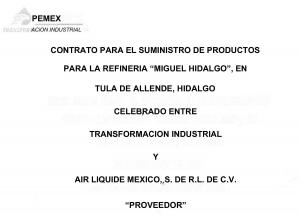Air Liquide's Hydrogen Pricing Dispute in Mexico Assessed by Houston's Baker & Associates, Energy Consultants
Government rumbles of expropriation imperil Air Liquide's hydrogen contract with Pemex
Air Liquide S.A. (NASDAQ:AIQUF)
Two recent decrees issued by the government concern the hydrogen plant at Pemex’s Tula refinery in the State of Hidalgo. In the decree issued February 9, the government declared that the plant at the refinery is of “public utility,” a legal requirement one step away from expropriation.
For two independent reasons, the decree perceives that state ownership of the hydrogen plant (which had been sold to Air Liquide, S.A., the French global industrial gas supplier), should be pursued. One reason is that the unit cost of hydrogen is excessive when crude oil volumes in the refinery train are low. The second reason is that hydrogen is a critical component in the production of motor fuels upon which the national economy depends. Hence, state ownership of the hydrogen plant contributes to national energy security.
In this perspective, the outsourcing of critical links in the hydrocarbon value should be avoided for the sake of energy security.
This perspective, however, is at odds with the business strategy of the previous administration. The decision that was taken by Pemex in 2017 to outsource hydrogen supply at the Tula refinery was a belated adoption of a global best practice. “Refining crude oil is the core business of a refinery. Everything else should be outsourced. Refineries routinely contract for industrial gases. It's normal practice," insists Alejandro González, the Mexican head of supply, trading, and logistics for a large refinery in Vietnam.
According to the report, industry observers wonder if the unspoken agenda of the decree of December 29, which ordered the temporary occupation of the hydrogen plant, and which would be complemented by the cited decree of February 9, is the renegotiation of the terms and conditions of the 20-year hydrogen supply contract with Air Liquide.
They speculate that the administration led by Andrés Manuel López Obrador is deploying the rationale of national energy security and the prospect of expropriation to persuade Air Liquide to renegotiate its hydrogen supply contract with Pemex Transformación Industrial (PTRI) in its Tula refinery. Plan B would be expropriation if negotiations were to fail.
Some analysts question the legality of the decrees; for example, Mexico City energy lawyer Juan Carlos Collado discerns that “the Energy Ministry’s arguments regarding the temporary occupation of the hydrogen plant, and which are recycled in the decree that classifies it as an object of ‘public utility,’ may be rebutted by Air Liquide. These arguments may not meet the legal standard of public utility,” he insists.
Mr. Collado emphasizes that “such legal actions are against the government, not against Pemex, adding that “settlement between the parties is always preferable to going to court.”
Industry observers are concerned, however, that the government’s preference for state ownership and control may jinx the negotiations. A decree of expropriation would be an abrupt change for both parties: Pemex would become the less efficient operator of the plant with ill-prepared, unionized workers working with an historically inadequate maintenance budget. Air Liquide would face an uncertain future regarding its legal remedies, indemnity, and compensation for lost revenue.
There are 15 years remaining on a 20-year contract with a basic monthly fee of US$1.47 million. As no Pemex contract has language that addresses liabilities in the event of expropriation, the parties are in terra incognita.
“If nothing is settled otherwise, the dispute will have to go to arbitration, per section 40 of the contract,” an American oil products market analyst told us who asked that his name be withheld. “Filing suit against Pemex, however, carries a high cost, enforced informally, of exclusion from future bidding opportunities," he warned.
Much about the plant’s sale and service agreement are outside public view. Neither the sales contract nor the annexes to the hydrogen supply contract is available online. There was no public tender. Negotiations were conducted directly from the office of Pemex’s director-general, José Antonio González Anaya, a source in PTRI stated, off-the-record.
“Had I been Pemex general counsel, I would never have approved this contract in its present form,” says Mr. Collado. “The contract suffers from a lack of clarity regarding the determination of a monthly lump sum. Clauses 9.1 and 9.2 are inconsistent, as are others. Quoting a lump sum price for a future, undefined expansion of the hydrogen plant is bizarre and may be unenforceable."
The consultancy concludes that for the company, “there are three lines of action ahead: negotiate a settlement with Pemex; seek legal protection in court against the decrees; and file for arbitration against PTRI,” discerns George Baker, principal author of the management report.
“Should negotiations stall—as they did with Talos Energy and Pemex—and should the plant be expropriated—as was half of Talos’s equity in the Zama reservoir, but by regulatory mischief—compensation will reflect the views of a court or arbitration panel regarding fairness and equity to both parties. The awarded amount is likely to be less than what the company might expect in a U.S. or European jurisdiction,” Mr. Collado foresees.
“This imbroglio is a costly distraction for Pemex and a key contractor. The assertions about energy security convince few. This confrontation with a global company tarnishes Mexico’s reputation for respect for investor rights. Any scenario other than the status quo ante (except for an adjustment in pricing) would be a set-back for all parties,” opines market analyst Baker, “with potential legal, trade, and international repercussions. Pemex needs outsourced hydrogen in all its refineries, not just the one in Deer Park, Texas, where Air Products, another global supplier of industrial gases, has had the hydrogen contract for over a decade.”
He adds, “The business practice in its Deer Park refinery regarding hydrogen outsourcing should be the model for all Pemex refineries—including the newest one in Dos Bocas in the State of Tabasco.”
George Baker
Baker & Associates, Energy Consultants
+1 832-434-3928
g.baker@energia-mx.com
Visit us on social media:
Facebook
Twitter
LinkedIn
Other
Legal Disclaimer:
EIN Presswire provides this news content "as is" without warranty of any kind. We do not accept any responsibility or liability for the accuracy, content, images, videos, licenses, completeness, legality, or reliability of the information contained in this article. If you have any complaints or copyright issues related to this article, kindly contact the author above.



